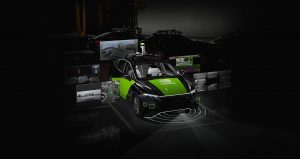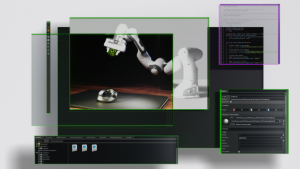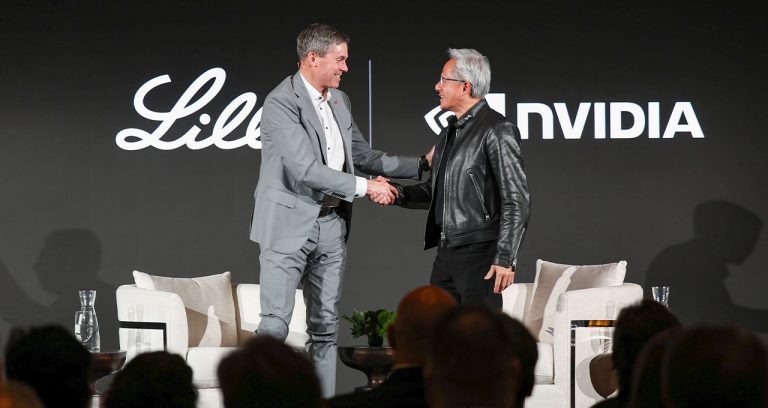Leading global transportation companies — spanning the makers of passenger vehicles, trucks, robotaxis and autonomous delivery systems — are turning to the NVIDIA DRIVE AGX platform and AI to build the future of mobility.
NVIDIA’s automotive business provides a range of next-generation highly automated and autonomous vehicle (AV) development technologies, including cloud-based AI training, simulation and in-vehicle compute.
At the CES trade show in Las Vegas this week, NVIDIA’s customers and partners are showcasing their latest mobility innovations built on NVIDIA accelerated computing and AI.
Readying Future Vehicle Roadmaps With NVIDIA DRIVE Thor, Built on NVIDIA Blackwell
The NVIDIA DRIVE AGX Thor system-on-a-chip (SoC), built on the NVIDIA Blackwell architecture, is engineered to handle the transportation industry’s most demanding data-intensive workloads, including those involving generative AI, vision language models and large language models.
DRIVE Ecosystem Partners Transform the Show Floor and Industry at Large
NVIDIA partners are pushing boundaries of automotive innovation with their latest developments and demos, using NVIDIA technologies and accelerated computing to advance everything from sensors, simulation and training to generative AI and teledriving, and include:
Delivering 1,000 teraflops of accelerated compute performance, DRIVE Thor is equipped to accelerate inference tasks that are critical for autonomous vehicles to understand and navigate the world around them, such as recognizing pedestrians, adjusting to inclement weather and more.
At CES, Aurora, Continental and NVIDIA announced a long-term strategic partnership to deploy driverless trucks at scale, powered by the next-generation NVIDIA DRIVE Thor SoC. NVIDIA DRIVE Thor and DriveOS will be integrated into the Aurora Driver, an SAE level 4 autonomous driving system that Continental plans to mass-manufacture in 2027.
Arm, one of NVIDIA’s key technology partners, is the compute platform of choice for a number of innovations at CES. The Arm Neoverse V3AE CPU, designed to meet the specific safety and performance demands of automotive, is integrated with DRIVE Thor. This marks the first implementation of Arm’s next-generation automotive CPU, which combines Arm v9-based technologies with data-center-class single-thread performance, alongside essential safety and security features.
Tried and True — DRIVE Orin Mainstream Adoption Continues
NVIDIA DRIVE AGX Orin, the predecessor of DRIVE Thor, continues to be a production-proven advanced driver-assistance system computer widely used in cars today — delivering 254 trillion operations per second of accelerated compute to process sensor data for safe, real-time driving decisions.
Toyota, the world’s largest automaker, will build its next-generation vehicles on the high-performance, automotive-grade NVIDIA DRIVE Orin SoC, running the safety-certified NVIDIA DriveOS. These vehicles will offer functionally safe advanced driving-assistance capabilities.
At the NVIDIA showcase on the fourth floor of the Fontainebleau, Volvo Cars’ software-defined EX90 and Nuro’s autonomous driving technology — the Nuro Driver platform — will be on display, built on NVIDIA DRIVE AGX.
Other vehicles powered by NVIDIA DRIVE Orin on display during CES include:
Zeekr Mix and Zeekr 001, which feature DRIVE Orin will be on display along with the debut of Zeekr’s self-developed ultra-high-performance intelligent driving domain controller that will be built on DRIVE Thor and the NVIDIA Blackwell architecture (LVCC West Hall, booth 5640)
Lotus Eletre Carbon (LVCC West Hall, booth 4266 with P3 and 3SS and booth 3500 with HERE)
Rivian R1S and Polestar 3 activated with Dolby — vehicles on display and demos available by appointment (Park MGM/NoMad Hotel next to Dolby Live)
Lucid Air (LVCC West Hall booth 4964 with SoundHound AI)
Zeekr MIX
Rivian R1S
NVIDIA’s partners will also showcase their automotive solutions built on NVIDIA technologies, including:
Arbe: Delivering next-generation, ultra-high-definition radar technology, integrating with NVIDIA DRIVE AGX to revolutionize radar-based free-space mapping with cutting-edge AI capabilities. The integration empowers manufacturers to incorporate radar data effortlessly into their perception systems, enhancing safety applications and autonomous driving. (LVCC, West Hall 7406, Diamond Lot 323)
Cerence: Collaborating with NVIDIA to enhance its CaLLM family of language models, including the cloud-based Cerence Automotive Large Language Model, or CaLLM, powered by DRIVE Orin.
Foretellix: Integrating NVIDIA Omniverse Sensor RTX APIs into its Foretify AV test management platform, enhancing object-level simulation with physically accurate sensor simulations.
Imagry: Building AI-driven, HD-mapless autonomous driving solutions, accelerated by NVIDIA technology, that are designed for both self-driving passenger vehicles and urban buses. (LVCC, West Hall, 5976)
Lenovo Vehicle Computing: Previewing (by appointment) its Lenovo AD1, a powerful automotive-grade domain controller built on the NVIDIA DRIVE Thor platform, and tailored for SAE level 4 autonomous driving.
Provizio: Showcasing Provizio’s 5D perception Imaging Radar, accelerated by NVIDIA technology, that delivers unprecedented, scalable, on-the-edge radar perception capabilities, with on-vehicle demonstration rides at CES.
Quanta: Demonstrating (by appointment) in-house NVIDIA DRIVE AGX Hyperion cameras running on its electronic control unit powered by DRIVE Orin.
SoundHound AI: Showcasing its work with NVIDIA to bring voice generative AI directly to the edge, bringing the intelligence of cloud-based LLMs directly to vehicles. (LVCC, West Hall, 4964)
Vay: Offering innovative door-to-door mobility services by combining Vay’s remote driving capabilities with NVIDIA DRIVE advanced AI and computing power.
Zoox: Showcasing its latest robotaxi, which leverages NVIDIA technology, driving autonomously on the streets of Las Vegas and parked in the Zoox booth. (LVCC, West Hall 3316).
Safety Is the Way for Autonomous Innovation
At CES, NVIDIA also announced that its DRIVE AGX Hyperion platform has achieved safety certifications from TÜV SÜD and TÜV Rheinland, setting new standards for autonomous vehicle safety and innovation.
To enhance safety measures, NVIDIA also launched the DRIVE AI Systems Inspection Lab, designed to help partners meet rigorous autonomous vehicle safety and cybersecurity requirements.
In addition, complementing its three computers designed to accelerate AV development — NVIDIA AGX, NVIDIA Omniverse running on OVX and NVIDIA DGX — NVIDIA has introduced the NVIDIA Cosmos platform. Cosmos’ world foundation models and advanced data processing pipelines can dramatically scale generated data and speed up physical AI system development. With the platform’s data flywheel capability, developers can effectively transform thousands of real-world driven miles into billions of virtual miles.
Transportation leaders using Cosmos to build physical AI for AVs include Fortellix, Uber, Waabi and Wayve.
Learn more about NVIDIA’s latest automotive news by watching NVIDIA founder and CEO Jensen Huang’s opening keynote at CES.
See notice regarding software product information.










